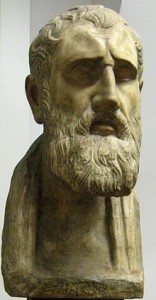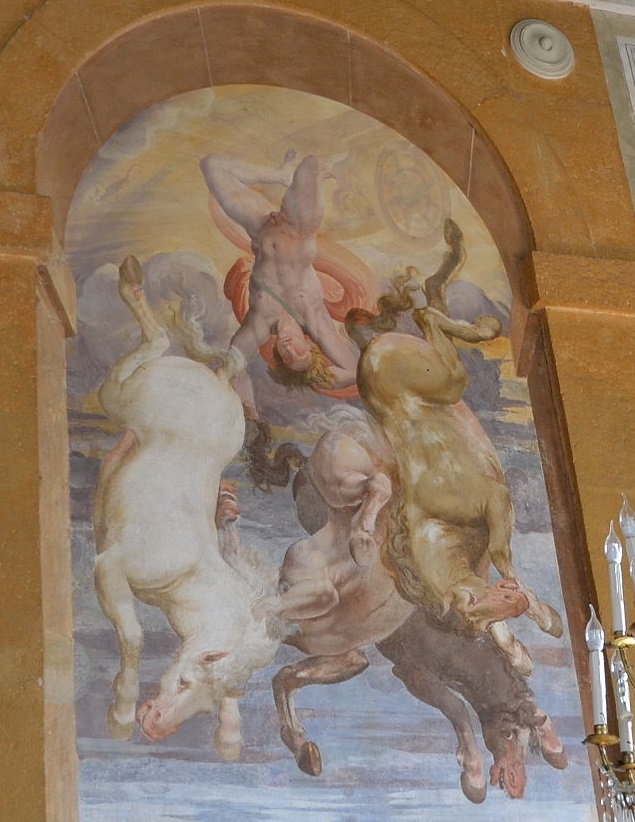Several times recently I’ve come across friends mentioning neo-Stoicism as an increasingly popular movement. This is perhaps an aspect of a wider revival of interest in the Hellenistic philosophies of the later Greek and Roman times (Stoicism, Scepticism and Epicureanism) as practical ways of life, perhaps developing out of frustration with the dogmatic limitations of analytic philosophy on the one hand and established religions on the other. Coincidentally, too, I’ve recently been teaching about these Hellenistic philosophies in an adult education class, and finding they raise a lot of interest in the students. This revival of interest may well have a lot to do with a search for the Middle Way, integrating experience and avoiding both positive and negative dogmas. But there are also limitations in the traditions of the Hellenistic philosophies themselves that carry the danger of them becoming new dogmas for the people that adopt them.
Perhaps I’ll write some other blogs in the future about Scepticism/ Pyrrhonism and Epicureanism, but here I want to focus on Stoicism, which seems to be the most popular of the three at present. Stoicism is a long and influential tradition, beginning with Zeno of Citium (c. 334-262 BCE), popular amongst educated Romans, and marked by such famous figures as Chrysippus, Cicero, Seneca, Epictetus and the Emperor Marcus Aurelius. The term ‘Stoicism’ came from the stoa (porch or colonnade) where the earliest Stoics used to hold their discussions. It also had a major influence on the development of early Christianity. 
What might be attracting people to Stoicism today? I suspect that the integration of philosophical theory with moral and spiritual practice is a key element. Established modern thinking has suffered so much from the unnecessary disjunction of facts and values, and accompanying impoverishment of ethics, that people would have good reasons for yearning for a philosophical era before the breach occurred. But meaningful ethics is also an activity needing practical support rather than just instruction.
Writers such as Pierre Hadot and Martha Nussbaum have done a great deal to raise awareness of the spiritual and therapeutic practices in Stoicism, which have a great deal in common with Buddhist practice. For someone with a background in Buddhist meditation, the Stoic practice of prosoche sounds very much like mindfulness, and oikeoisis very much like loving-kindness meditation. There is also an attractive meditation exercise called the ‘flight of the soul’ or ‘view from above’, in which you put your life into perspective by imagining a flight into the sky and look down on the circumstances of your current life. For more on Stoic practices, see this excellent booklet by a number of collaborating academics.
It would be quite possible to make use of such practices without necessarily accepting Stoic philosophy, and indeed, I would argue with Stoicism (as with Christianity, Islam or any other tradition) that one is responsible for one’s own interpretation of it, and can always make use of the resources that it offers whilst taking care to avoid its absolutisations. However, I think it is important to be aware that Stoicism is also a dogmatic philosophy. There is always a danger when people adopt such material from another context that they will gloss over the dogmatic elements, which may seem to have a much more limited practical impact than the more obvious dogmas today coming from evangelical pulpits or the propaganda of groups like Daesh/ Isis. Even if we take such dogmas on board only because they seem to be part of the deal in a practically useful package, there is still a danger that they can be used to support unhelpful absolute judgements further down the line after the approach has become more established and enculturated.
The central dogma of Stoic philosophy is the metaphysical belief in the logos or rational ordering of nature. The universe is believed to have a purpose, and human beings to be too easily distracted from that purpose. Nevertheless, Stoic practice is believed to help us develop the orthos logos, or natural order within each of us as individuals, which then fits into the cosmic order. To do this we can use integrative practices and become aware of our biases. There seems to me here an obvious dogmatic leap: because we overcome our biases and become more objective in our judgement, we do not necessarily participate in a natural order. Given that the appeal to a natural order is so frequently the basis of biased assumptions and fallacious reasoning, a dangerous contradiction thus lies at the heart of Stoic thinking.
The links between Stoicism and early Christianity should also be evident here. Christians have often taken the Stoic logos and merely installed God as the overseer of this natural order. But whether or not there is a personality at the head of it, belief in and absolute order of nature raises the same problems, foremost of which is the problem of evil. If the order of the universe is ultimately good, why do we encounter so much evil in it? The same theological arguments found over evil in Christianity are also found in the Stoic tradition, and they seem to me to arise not because there aren’t hidden benefits to what we take to be ‘evil’ that we would do well to recognise, but because the goodness of nature (with or without God) is absolutised. Whatever explanations for evil and suffering we come up with, they are never likely to fully vindicate the extent of it that we encounter. But we have no need to adopt this belief in absolute cosmic good in the first place when it tends to lead us into defending and vindicating evil.
Together with the metaphysics of logos in Stoicism, there is also an epistemological dogma: the phantasia kataleptike. This is the belief that, despite sceptical arguments to the contrary, it is possible to gain certainty in our beliefs about the cosmos, because our language is capable of representing the truth as long as it is fully formed into propositions, justified by experience in normal reliable circumstances and known by a wise man. This is an approach that closely parallels that of scientific naturalists today, who tend to dismiss sceptical arguments that cast doubt on claims to knowledge by assuming the reliability of normal observation and demanding positive reasons to justify doubt. The trouble is, of course, that we have no way of knowing whether or not our observations take place in ‘normal’ circumstances, and all the evidence about the way we process the meaning of language suggests that it does not simply form truth-correspondent propositions that can be reliably verified. Without a wider sceptical perspective we are liable to get stuck in the most basic cognitive bias of them all – confirmation bias. The Stoics may well believe the universe is ordered because they interpret the world they observe in those terms, which then reinforces their belief that the universe is ordered.
I find that when raising issues like this about any tradition of thinking, they are readily dismissed as philosophers’ quibbles. But, particularly when a tradition has been revived or reinterpreted relatively recently, it seems a great shame if people nevertheless adopt dogmas from the past rather than taking the opportunity to correct past mistakes. To do so doesn’t necessarily mean abandoning a tradition one has found fruitful, together with its potentially helpful cultural, practical and social elements, but it may mean going through a rigorous critical process to distinguish what caused things to go wrong in the past and may do so again. Most basically, I would warn that any absolutisation can be used as a shortcut to justifying the use of power. In Stoicism, for example, one can readily imagine someone claiming to be a ‘wise man’ with claimed true representations of the cosmic logos (functionally indistinguishable from religious revelations) starting a neo-Stoic cult. The best way to stop that ever happening is to ensure that absolute beliefs about the natural order are no longer part of Stoicism.
But in the meantime, I wouldn’t want to discourage anyone from engaging with the rich resources of Stoic practice if they find it helpful to do so, provided they do so also with critical discrimination. Indeed, the Hellenistic philosophies in general offer a great field of cultural and philosophical resources that until recently was largely forgotten and misunderstood by Western philosophers. I’d particularly recommend Pierre Hadot’s Philosophy as a Way of Life and Martha Nussbaum’s Therapy of Desire to anyone wanting to engage with the Hellenistic philosophies as practice.


